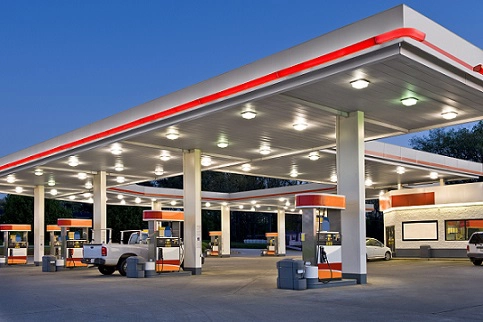Gas stations are one of the most common small businesses in the US. Most stations are owned by small operators. Despite their popularity with small business owners, gas stations are also one of the most difficult acquisitions to finance. In this article, we examine how to finance a gas station acquisition and cover the following subjects:
- Financing options
- Most common financing structure
- Lender requirements
- Deal killers
Financing options
Most gas station investments have an acquisition value below five million dollars. These acquisitions are often made by people who want to invest in a gas station to become a small business owner. In other cases, the acquisitions are made by existing small business owners who are expanding their holdings. Transactions in this market segment are usually funded through three sources:
1. Your money
The easiest way to buy a gas station is to pay for it yourself. This method eliminates all the due diligence that lenders impose on buyers. However, this is also the least common way to acquire a business. Few buyers can afford to pay for the whole acquisition out of their own funds.
Although buyers are not expected to pay for the whole acquisition, they do have to contribute funds to the transaction. This contribution is often referred to as an “equity injection.”
2. Seller financing
Sellers often provide financing as an incentive to buyers. Getting seller financing, if offered at reasonable terms, has a number of advantages.
3. Business acquisition loans
Most transactions use a business acquisition loan to pay for part or most of the acquisition. Note that gas station finance is a specialized field. Not every lender is comfortable financing gas stations.
Common acquisition structure
In most gas station purchases, the buyer is trying to acquire the largest gas station that they can afford. At the same time, they want to use as little of their own money as they can. This type of acquisition is known as a leveraged buyout (LBO) and is very common in small business acquisitions.
LBOs have the benefit of potential high returns relative to the buyer’s investment. This benefit makes them attractive to buyers. However, leverage works both ways. If things don’t go as planned, the purchase can eliminate the buyer’s equity. This outcome could put the business at risk. Consequently, leveraged buyouts have an additional level of risk.
Most gas station acquisitions are structured as follows:
1. Buyer’s equity injection (10% minimum)
The vast majority of acquisitions require the buyer to invest some of their own money. To the best of our knowledge, no lender provides 100% financing for a transaction.
Most lenders require that the buyer provide at least 10% of the acquisition value as equity. These funds cannot be borrowed nor can they come from the seller. They must come from the buyer and their partners.
2. Seller financing (0% to 20%)
Sellers don’t like offering financing to buyers. Obviously, they’d prefer to get paid immediately and be done with the transaction. Sellers can get away without offering financing if there is a lot of buyer demand for their business. If there isn’t substantial demand for their business, they need to offer financing as an incentive to buyers.
Most sellers who are willing to provide financing can offer competitive terms and rates. Sellers can be more flexible than regular lenders, so it is usually to the buyer’s advantage to use seller financing.
More importantly, seller financing ties the seller to the business for the term of the loan. In many cases, payment is contingent on the gas station meeting some targets. This arrangement helps limit the amount of “over-selling” they do when promoting the business.
Seller financing can cover up to 20% of the acquisition value. It’s unusual to find a seller willing to finance more than that.
3. SBA-backed financing
Most gas station purchases are executed using a facility that is backed by the Small Business Administration (SBA). SBA-backed loans finance the majority of small business acquisitions.
The SBA does not finance any acquisitions directly. Rather, it provides incentives to lenders and banks that, in turn, finance these acquisitions. These incentives enable the lenders to provide loans at very competitive terms.
Getting a small business acquisition loan from a lender that is not SBA-backed is difficult. Due to the risk, they require borrowers to have substantial collateral. They also have higher personal credit requirements and qualification requirements than SBA-backed lenders. Learn more about “How to get a business acquisition loan.”
What do lenders look for in a transaction?
Knowing how your lender looks at a transaction and understanding their requirements is critical to your success. Unfortunately, many buyers gloss over this important issue. Understanding your lender helps you craft an offer that has a better chance of success.
Most lenders look for the following:
1. Gas stations with solid revenues
As a rule, lenders want to be repaid from proceeds of the business. This means that the gas station you plan to buy must be able to cover its expenses, your salary, and the financing costs. Lenders are not likely to support a transaction that is in “turn around” mode, unless you can make an exceptionally good business case to them.
2. Buyer industry experience
Lenders want to work with buyers who have direct experience running a gas station. This requirement can create a problem for borrowers who want to get into the industry. Fortunately, there is a way to solve this problem. Most lenders will work with borrowers who have limited experience as long as they are willing to hire a current manager from the gas station for a period of time.
3. Buyer equity injection
Lenders expect buyers to contribute funds to the transaction. On average, they expect buyers to contribute around 10% of the acquisition price. Getting 100% financing for a business acquisition is nearly impossible. Actually, we are not familiar with any lender that finances such a transaction. However, we are familiar with lenders that will disqualify buyers who demand this type of financing.
If you plan to ask about 100% financing, consider asking professionally and somewhat indirectly. For example, ask about their lowest equity requirements and ask if they support full financing.
4. Reasonable personal credit
Business lenders look at the buyer’s personal credit during their decision-making process. SBA-backed lenders require a minimum personal credit score of around 650. Non-SBA-backed lenders have higher requirements.
Buyers are often puzzled to learn that lenders evaluate their personal credit. After all, they want a business loan and not a personal loan. Lenders know that small businesses don’t manage themselves. Businesses are managed by their owners. The buyer’s personal credit serves as a proxy, albeit an imperfect one, of the buyer’s financial management behaviors.
5. Reasonable business financial statements
Lenders review the gas station’s financial statements and tax returns during the due diligence process. They want to see a well-managed gas station that is profitable and able to support the loan.
6. No (or manageable) environmental issues
One of the main challenges of buying a gas station is the environmental risk that comes with it. The environmental assessment is one of the most important parts of the due diligence process. It can discover any past or present environmental damage. Obviously, lenders shy away from transactions that have an environmental risk that is too high.
7. Location and real estate
Gas stations need a good location to be successful. Consequently, lenders consider the location to be a key component of the transaction. If you don’t control the real estate, you have no control over the gas station’s location. You would be at the mercy of the landlord, which is something the lender does not want to risk.
There are two ways to remove this risk. One option is to get a lease that covers the term of the loan. Alternatively, you can try to buy the real estate. Keep in mind that some locations may restrict the brand of fuel sold from them.
8. Diversified revenues
Selling fuel is a high-volume, low-margin business. Most lenders prefer to finance gas stations that have diversified revenues. These revenues can come from convenience stores, mini-marts, car washes, quick-lube centers, and other services.
Gas station deal killers
Business acquisition transactions can fall through for a number of reasons. However, some common problems arise fairly often in gas station acquisitions. Keep these in mind when performing due diligence.
1. Environmental issues
The environmental assessment should inspect the station’s tanks and other potential sources of contamination (e.g., lube center, car wash). Serious environmental issues can easily derail a transaction. The last thing you want is to buy a gas station with serious and expensive problems. Most lenders shy away from a transaction with challenging environmental problems.
2. No real estate included
A transaction that does not include the real estate is declined by most lenders.
3. Inaccurate financial statements
As part of the due diligence, you get a chance to review the gas station’s financial statements. However, not every gas station owner is able to produce accurate financial statements. This problem can become more challenging if the gas station has a large portion of cash sales that go unreported. The lender will not finance the transaction if you are unable to get reliable financial reports.
Be smart – get advice
Gas station acquisitions are more difficult than conventional acquisitions. Their due diligence includes the potential for environmental risks and making financial sense of multiple profit centers. Each of these profit centers needs to be evaluated like small businesses themselves. A smart strategy is to invest in a good “deal advisory” team. Work with a reputable CPA or financial professional to help you evaluate the financial state of the business. Additionally, hire a reputable environmental assessments company with experience in the gas station industry.

